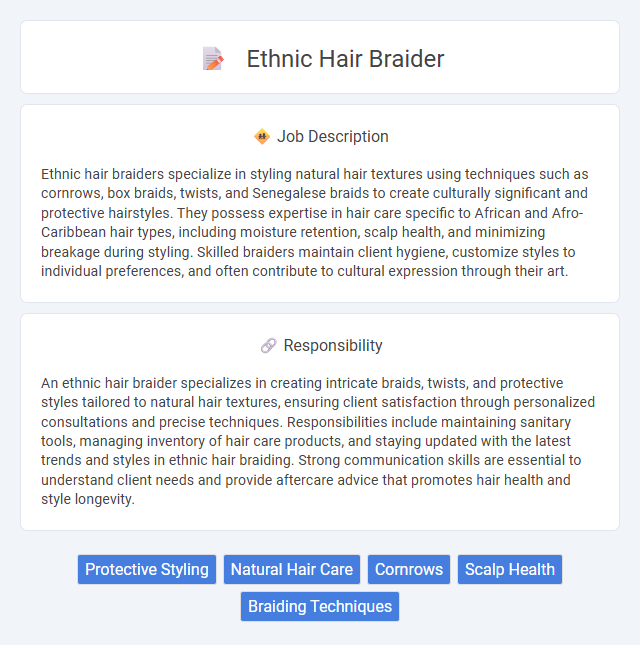
Ethnic hair braiders specialize in styling natural hair textures using techniques such as cornrows, box braids, twists, and Senegalese braids to create culturally significant and protective hairstyles. They possess expertise in hair care specific to African and Afro-Caribbean hair types, including moisture retention, scalp health, and minimizing breakage during styling. Skilled braiders maintain client hygiene, customize styles to individual preferences, and often contribute to cultural expression through their art.
Individuals with a passion for hairstyling and strong interpersonal skills may find the role of an ethnic hair braider suitable, as it requires creativity and patience in working with diverse hair textures. Those comfortable with physical activity and prolonged periods of standing might better adapt to the job's demands. People who prefer routine tasks or limited social interaction might find this profession less fitting.
Qualification
Ethnic hair braiders must possess specialized skills in various braiding techniques such as cornrows, box braids, and twists, requiring extensive hands-on experience and artistic precision. Formal certification or licensing varies by location but often includes completion of state-approved cosmetology or natural hair braiding programs, emphasizing sanitation and scalp health. Strong knowledge of hair texture diversity and cultural hairstyling trends is essential to meet the unique needs of diverse clients effectively.
Responsibility
An ethnic hair braider specializes in creating intricate braids, twists, and protective styles tailored to natural hair textures, ensuring client satisfaction through personalized consultations and precise techniques. Responsibilities include maintaining sanitary tools, managing inventory of hair care products, and staying updated with the latest trends and styles in ethnic hair braiding. Strong communication skills are essential to understand client needs and provide aftercare advice that promotes hair health and style longevity.
Benefit
Ethnic hair braiders likely enjoy the benefit of flexible working hours, which allows them to balance personal and professional commitments efficiently. The role probably offers creative satisfaction due to the artistry involved in designing unique hairstyles tailored to diverse hair textures. Economic benefits may arise from a steady demand in multicultural communities, providing consistent job opportunities and potential for entrepreneurial growth.
Challenge
Ethnic hair braiders may face challenges related to maintaining scalp health while creating intricate styles, which requires careful technique and knowledge of hair types. There is a probability of encountering physical strain due to long hours spent on detailed braiding work. Client satisfaction could be difficult to achieve consistently because individual hair textures and preferences vary widely.
Career Advancement
Ethnic hair braiders can advance their careers by acquiring specialized certifications in hair care techniques, expanding their clientele through social media marketing, and opening their own salons or studios. Pursuing additional education in cosmetology enhances credibility and opens opportunities for roles such as salon manager or beauty consultant. Building a strong reputation within the community significantly increases demand for services and potential for partnerships with hair care product brands.
Key Terms
Protective Styling
Ethnic hair braiders specialize in protective styling techniques such as box braids, twists, and cornrows to maintain hair health and prevent damage. These styles shield natural hair from environmental stressors while promoting growth by reducing breakage and moisture loss. Mastery in scalp care and product knowledge is essential to ensure client satisfaction and hair longevity.
Natural Hair Care
Ethnic hair braiders specialize in maintaining and styling natural hair textures, using techniques that promote scalp health and prevent hair damage. Expertise in moisturizing methods, protective styling, and the use of sulfate-free, natural hair products ensures client hair stays strong and hydrated. Knowledge of cultural hair traditions and current trends allows braiders to offer customized care tailored to diverse hair types and conditions.
Cornrows
Ethnic hair braiders specializing in cornrows possess expert skills in creating intricate, tightly woven patterns that protect natural hair while enhancing cultural expression. Mastery of precision parting, scalp care, and braid tension is crucial to prevent damage and ensure long-lasting styles. Professionals in this field often cater to diverse clients seeking traditional African hairstyles that blend aesthetic appeal with hair health benefits.
Scalp Health
Ethnic hair braiders specialize in protective hairstyles that promote scalp health by minimizing tension and preventing hair breakage. Proper technique and use of scalp-friendly products help reduce irritation and maintain moisture balance, supporting a healthy hair growth environment. Skilled braiders assess scalp conditions regularly to avoid issues such as dandruff or folliculitis, ensuring long-term scalp wellness for clients.
Braiding Techniques
Ethnic hair braiders specialize in intricate braiding techniques such as cornrows, box braids, Senegalese twists, and micro braids, which require precision and skill to create neat, lasting styles. Mastery of these techniques involves understanding various hair textures and proper sectioning methods to prevent damage while achieving desired tension and pattern uniformity. Proficiency in using tools like rat-tail combs, hairpins, and moisturizing products ensures both stylistic excellence and scalp health throughout the braiding process.
 kuljobs.com
kuljobs.com